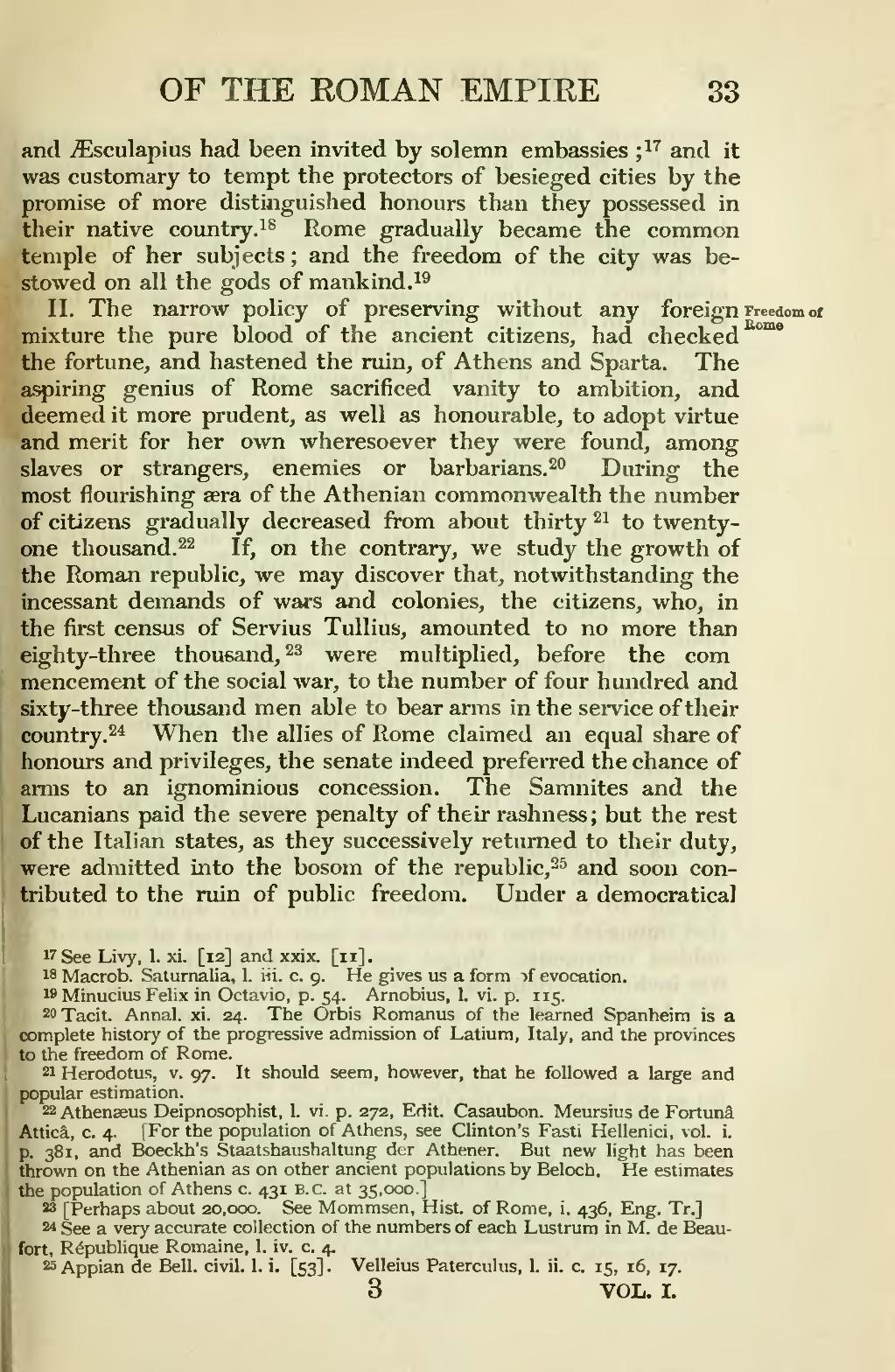This page has been validated.
OF THE ROMAN EMPIRE
33
and Æsculapius had been invited by solemn embassies;[1] and it was customary to tempt the protectors of besieged cities by the promise of more distinguished honours than they possessed in their native country.[2] Rome gradually became the common temple of her subjects; and the freedom of the city was bestowed on all the gods of mankind.[3]
Freedom of Rome II. The narrow policy of preserving without any foreign mixture the pure blood of the ancient citizens, had checked the fortune, and hastened the ruin, of Athens and Sparta. The aspiring genius of Rome sacrificed vanity to ambition, and deemed it more prudent, as well as honourable, to adopt virtue and merit for her own wheresoever they were found, among slaves or strangers, enemies or barbarians.[4] During the most flourishing æra of the Athenian commonwealth the number of citizens gradually decreased from about thirty[5] to twenty-one thousand.[6] If, on the contrary, we study the growth of the Roman republic, we may discover that, notwithstanding the incessant demands of wars and colonies, the citizens, who, in the first census of Servius Tullius, amounted to no more than eighty-three thousand,[7] were multiplied, before the commencement of the social war, to the number of four hundred and sixty-three thousand men able to bear arms in the service of their country.[8] When the allies of Rome claimed an equal share of honours and privileges, the senate indeed preferred the chance of arms to an ignominious concession. The Samnites and the Lucanians paid the severe penalty of their rashness; but the rest of the Italian states, as they successively returned to their duty, were admitted into the bosom of the republic,[9] and soon contributed to the ruin of public freedom. Under a democratical- ↑ See Livy, l. xi. [12] and xxix. [11].
- ↑ Macrob. Saturnalia, l. iii. c. 9. He gives us a form of evocation.
- ↑ Minucius Felix in Octavio, p. 54. Arnobius, l. vi. p. 115.
- ↑ Tacit. Annal. xi. 24. The Orbis Romanus of the learned Spanheim is a complete history of the progressive admission of Latium, Italy, and the provinces to the freedom of Rome.
- ↑ Herodotus, v. 97. It should seem, however, that he followed a large and popular estimation.
- ↑ Athenæus Deipnosophist, l. vi. p. 272, Edit. Casaubon. Meursius de Fortunâ Atticâ, c. 4. [For the population of Athens, see Clinton's Fasti Hellenici, vol. i. p. 381, and Boeckh's Staatshaushaltung der Athener. But new light has been thrown on the Athenian as on other ancient populations by Beloch. He estimates the population of Athens c. 431 B.C. at 35,000.]
- ↑ [Perhaps about 20,000. See Mommsen, Hist. of Rome, i. 436, Eng. Tr.]
- ↑ See a very accurate collection of the numbers of each Lustrum in M. de Beaufort, République Romaine, l. iv. c. 4.
- ↑ Appian de Bell, civil. l. i. [53]. Velleius Paterculus, l. ii. c. 15, 16, 17.
